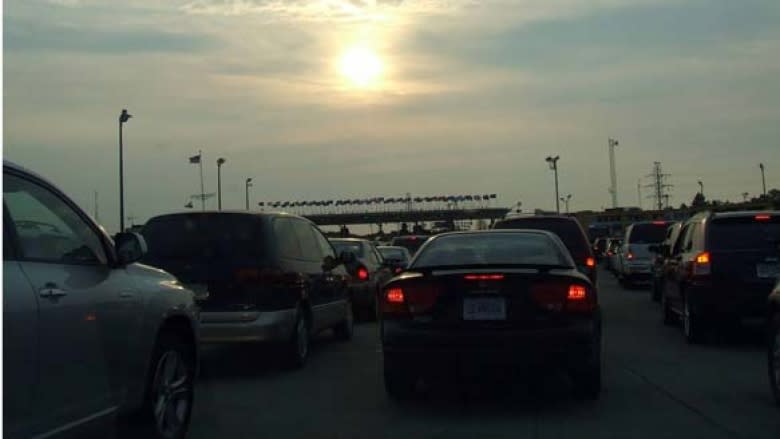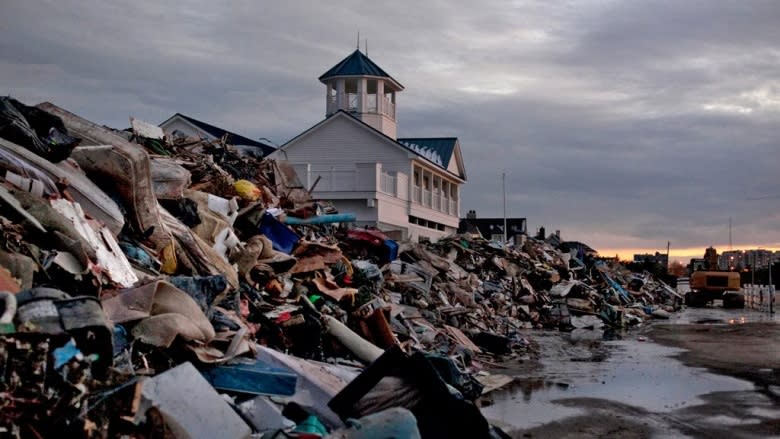Hamilton church volunteers denied entry to U.S. so they wouldn't 'steal American jobs'
A group of church volunteers from Hamilton heading south to do relief work were denied entry to the U.S. for fear they would take American construction jobs, said a spokesperson for the church.
The 12-person contingent from Hamilton's Rehoboth United Reformed Church was travelling by road on the morning of Saturday, March 11, to New Jersey.
Erik Hoeksema, the church's outreach director who was travelling with the group, said they intended to spend March break cleaning up and rehabilitating neighbourhoods affected by Hurricane Sandy.
U.S. border law says Canadians do not require a visa to enter the country for volunteer work, as long as they can provide proof that their work will not be compensated.
Hoeksema says the group was told they had failed to have a letter sent from the host church "paroling" them into the country.
"So what ends up happening is the organization that you're going to work with sends a letter to border patrol saying this is what they're going to be doing. What our group did not do, is we did not send that ahead of time," he admitted.
Hoeksema said the border patrol officer, who treated them cordially, told the group he would grant an exception and let them through if the host church managed to fax or email a letter right away.
'Stealing American construction jobs'
Hoeksema says he contacted Rev. Seth Kaper-Dale, the pastor at the Reformed Church of Highland Park in central New Jersey, which would be hosting the group, so he could fax a letter to border patrol explaining their intended purpose.
When the first letter was deemed "not specific enough" by a border patrol officer, Hoeksema said he texted Kaper-Dale to send another, being careful not to make any specific reference to construction.
"In general, mission teams do team-building, tour mercy ministries of the church (food pantries, re-entry programs, thrift shops, etc) and assist with neighbourhood cleanup projects," said the second letter.
It was this last part that was interpreted as "work for hire," says Hoeksema. Officers denied them entry after they had been stopped for more than two hours.
"It's not a new thing that groups are going down there and helping out," said Hoeksema. "In the past, our groups would go down and help in impoverished neighbourhoods and maybe they would even do some light construction."
"I think everybody knows that's what groups are doing down there when they're volunteering. Common sense has it that we're not going down there to steal American jobs. We're helping people."
'No pressing need'
Hoeksema says this was not the church's first relief work trip headed south of the border. Many individuals from the congregation have, in previous years, travelled to volunteer on their own or with a group down to other states such as Kentucky or Pennsylvania.
On this occasion, however, the group was told that, as foreigners, they would be taking American jobs, and that there was no pressing need for relief work anyway this long after Hurricane Sandy hit the region in 2012.
"Hurricane Sandy happened five years ago ... but the unfortunate thing for people who live in poverty is that they don't get over these things as quickly as others," he explained.
"They obviously can't afford to remove the barriers that are in front of them on their own, so they rely on volunteers coming. And that's all we were trying to do, go help others."
Kaper-Dale agreed, saying it takes an average of seven years to get an impoverished family back on its feet.
"We still have people living in their yards and in trailers while their houses are not completed because of financial shortcomings and the distribution of funding after Hurricane Sandy. Honestly, it just takes a long time to rebuild."
A U.S. border spokesperson said the refusal came down to documentation. The official said groups doing humanitarian work need to provide documentation in advance from the municipality where the work is to be done stating what they will be doing.
"In this case, CBP attempted to assist the group, but ultimately the group was unable to obtain the proper documentation to support this visit," said the spokesperson.
Frustrated and shocked
Kaper-Dale, who said the group had been co-ordinating their stay at the New Jersey church for months, was frustrated and shocked by the incident.
"We've hosted other Canadian groups, and we've always been appreciative of their coming, and no Canadian group has ever had any issue at the border."
He said he'd never had to send out a letter before, and believed that the changes were a reflection of political changes in the U.S.
"If you can't get a church van with 12 white folks through [the border], how much worse is it for any person of colour, any person born somewhere else, any person whose name sounds foreign to an [Immigration, Customs and Enforcement] officer, or any refugee?"
Hoeksema said all members of the Hamilton group were carrying Canadian passports and had previously travelled to the U.S. with no incident.
"We probably would've gotten through if we'd just said we were visiting," he said.



